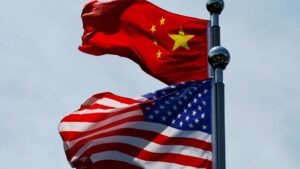U.S.-China Business Relations: A Shift in Manufacturing Strategies
By Extreme Investor Network Team
As the global market continues to evolve, the relationship between the U.S. and China remains a focal point for many businesses. Recent findings from an annual survey conducted by the American Chamber of Commerce in China reveal significant shifts in how U.S. companies are approaching their operations in China.
Rising Relocation Trends
Over the past year, the landscape has changed dramatically, with 30% of U.S. companies now either considering or actively starting the diversification of their manufacturing or sourcing operations. This marks a notable increase from 24% last year—setting a new record and surpassing the previous high of 23% recorded in 2017 during the onset of the trade tensions initiated by former President Trump.
Michael Hart, the president of AmCham China, highlighted an essential factor in this trend: the ramifications of the COVID-19 pandemic. China’s strict lockdown measures and the isolation from international markets forced many businesses to reassess their reliance on a single geographic location for their supply chains. "This realization has triggered a wave of diversification," Hart noted, emphasizing the likelihood that this trend will continue to gain momentum.
Where Are Companies Relocating?
So, where are U.S. companies looking to move their operations? Interestingly, India and Southeast Asia remain the most attractive destinations for relocation, but the survey also indicates a rising interest in moving back to the U.S. In 2024, 18% of respondents indicated plans to relocate to the U.S., up from 16% in 2023.
While a significant portion of companies (67%) have no immediate plans to diversify their manufacturing, the shift in sentiment is notable. The ongoing challenges posed by U.S.-China tensions, local competition, and economic sluggishness in China are driving many to reconsider their strategies.
The State of U.S.-China Relations
As the geopolitical climate evolves, the implications for businesses are substantial. Over 60% of survey respondents identified U.S.-China relations as their top concern for conducting business in China moving forward. Local competition, particularly from state-owned enterprises, follows closely behind.
Recent announcements from the Trump administration regarding potential tariff increases further complicate the landscape. With the possibility of escalating tariffs set for February 2024, businesses are bracing for a turbulent environment. The Biden administration has taken a hard stance on technology restrictions for Chinese firms, which underscores the growing competition between the two superpowers.
Economic Growth: A Double-Edged Sword
Meanwhile, the Chinese economy faces its own challenges. Consumer spending has yet to regain momentum after the pandemic, prompting Chinese authorities to implement stimulus measures aimed at revitalizing growth and addressing the ongoing real estate slump.
The AmCham survey revealed that more than half of U.S. companies operating in China did not turn a profit in the last fiscal year, a figure that has persisted for three consecutive years. Moreover, the desire to invest in China is waning, with 21% of companies no longer considering China a preferred destination for investment, a doubling of the number since pre-pandemic.
Looking ahead, however, optimism remains among certain sectors. Companies engaged in technology, industrial manufacturing, and consumer services are eyeing domestic consumption growth as the most significant opportunity for 2025. Notably, firms offering services have identified the international expansion of local companies as a key area for future growth.
Conclusion: What Does This Mean for Investors?
At Extreme Investor Network, we understand that these shifting dynamics present both challenges and opportunities. As U.S. companies adapt to the evolving environment, it is essential for investors to stay informed and proactive. The focus on diversification can open up new avenues for growth, especially in emerging markets like India and Southeast Asia.
Navigating the complexities of U.S.-China relations requires insight and strategy. Our mission is to equip our readers and investors with the knowledge necessary to make informed decisions in this rapidly changing landscape.
Stay tuned for more insights on the intersection of global finance and commerce, and how these trends may impact your investment strategies.

